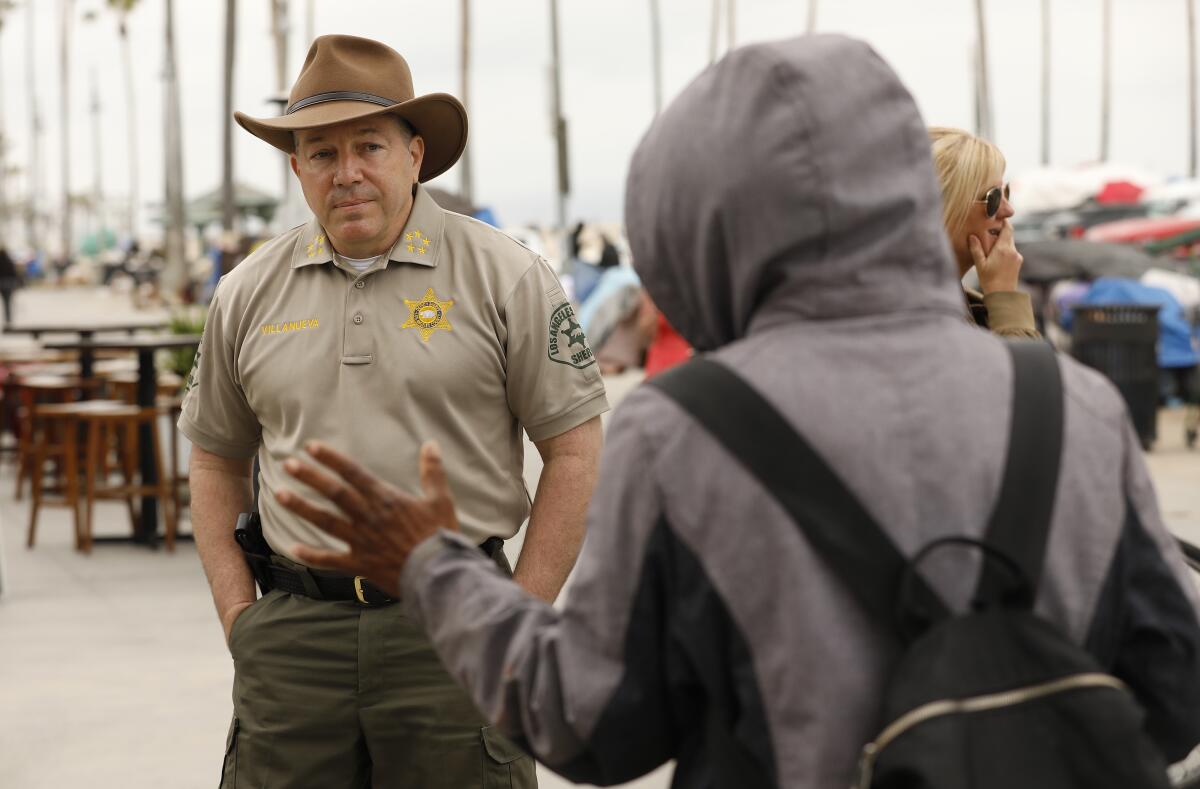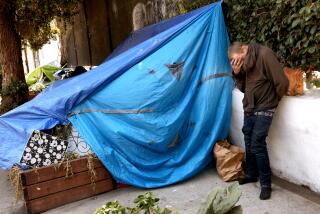Op-Ed: Villanueva’s bogus Venice ‘outreach’ is just a cover for criminalizing homelessness

- Share via
Sheriff Alex Villanueva’s deployment of armed deputies to the Venice boardwalk is at best a desperate political stunt and at worst a continuation of the long history of punitive abuse of poor people in Los Angeles.
Villanueva sent his troops to Venice shortly after the Los Angeles Democratic Party overwhelmingly voted to demand his resignation. Members of the Los Angeles County Board of Supervisors, along with the Civilian Oversight Commission for the Sheriff’s Department, have also asked him to resign. His deputies have shot dozens of people during his 2½ years in office; among those who were killed are Andres Guardado, who was shot five times in the back, and Dijon Kizzee, who was repeatedly shot after a minor bicycle infraction escalated.
Villanueva has failed to crack down on and has even expressed sympathy for deputy gangs. He has refused to hand over internal records to the inspector general. He has bullied and insulted his critics and is regarded as an ineffective leader.
Exploiting the situation in Venice provides Villanueva with a way to divert attention from his dismal record while he panders to wealthy homeowners who resent seeing unhoused people in their neighborhood. He poses as a tough guy who will rapidly remove people camping on the boardwalk, cleaning up after other politicians like L.A. City Councilman Mike Bonin, who some Venice residents wrongly blame for the situation.
The idea that Villanueva can ride into Venice and solve the problem is absurd, especially given that his only real tool is coercion.
The ongoing housing crisis has developed over decades as federal, state and local governments have drastically reduced investment in affordable housing. Housing stock for poor people has vanished. Rent levels have vastly outpaced income levels. The social safety net has diminished. The leading causes of homelessness are housing affordability, housing availability and poverty.
However, rather than providing housing and services for people in need, governments have increased policing, enforcing laws that criminalize basic life functions like sleeping in public spaces, and forcing people from one area to another. This criminalization punishes people, pushes them away from fragile community-based systems of care and makes their lives harder.
Venice, like many areas in Los Angeles, has gentrified, changing from an economically and racially mixed community to an overwhelmingly white and wealthy one. Newly established residents are increasingly intolerant of their less fortunate neighbors. While they decry encampments, they vehemently oppose initiatives to develop and preserve affordable housing or even provide temporary shelter or storage. Some demand aggressive policing to remove unhoused people.
Villanueva plays to this intolerance while mischaracterizing his incursion into Venice as a “humanitarian mission.” His deputies approach unhoused people, asking if they need housing and other services, then take down information about them. They pass out fliers. They call it “outreach” and publicly proclaim they are just trying to help people.
There are three major problems with this “outreach.” The uniformed deputies, in their flak jackets, with holstered guns, Tasers and batons, surrounding the people they approach, are unqualified for this task. Effective outreach cannot be accomplished by fear and coercion; it requires significant time to build trust.
Outreach works only when people see that the services offered will actually help them, which leads to the second problem. The housing and services the deputies offer don’t necessarily exist.
One homeless veteran with a disability who accepted their “housing” offer said he spent the night outside the Department of Veterans Affairs facility in Brentwood, only to return to the boardwalk. Some temporary shelter may be available, including enclosed camping facilities with miserable living conditions and dignity-stripping regulations like curfews and searches. People living on the boardwalk know these are likely to be very temporary solutions that will not help them in the long term.
The third, and most damaging, problem with the sheriff’s “outreach” is that it is just a cynical cover for the upcoming aggressive enforcement action aimed at clearing the beach of visibly poor people. It allows housed residents who buy into the fiction that Villanueva is helping people to tell themselves they are compassionate.
The sheriff has said that by July 4 people must accept services, leave or be arrested. LAPD Chief Michel Moore confirmed that Villanueva has reserved space in jail for “noncompliant” homeless people. The “outreach” is to identify and document people, in preparation for extracting them from the boardwalk. The intent is clear: Those who do not leave will be arrested and their property destroyed.
Using law enforcement to remove poor and homeless people is a common strategy. On skid row in downtown Los Angeles, the LAPD has deployed a significant number of officers to harass, cite and arrest people so that they will move away from a gentrifying area. While this strategy makes hard lives that much harder, it does nothing to solve the problem of homelessness. People cleared from Venice will go somewhere.
Instead of criminalizing homelessness, policymakers should invest in permanent, supportive, affordable housing. Rather than pose for dishonest photo opportunities, Villanueva should get out of Venice, and we should find humane solutions to this human tragedy.
Pete White is founder and executive director of the Los. Angeles Community Action Network.
More to Read
A cure for the common opinion
Get thought-provoking perspectives with our weekly newsletter.
You may occasionally receive promotional content from the Los Angeles Times.










